Conversation with Dr. Anne Luther
What does effective digital restitution look like?
Anne Luther und Medhavi Gandhi
- institutions have a sound approach to digital collections inventories and records of provenance. This allows institutions to identify collections that were acquired as a consequence of unequal power relationships and leads to the ethical question on the right of institutions to facilitate digital access, ownership and authorship.
- Institutions with access to digital infrastructure and technology, have to ask for permission to digitise and store digital assets during and after restitution processes. Not doing so re-establishes the colonial power structure by prohibiting & restricting the original community’s agency over their own cultural heritage.
There needs to be digital infrastructure that allows for the community of origin to decide who, how and in what context access is given. It is also a great opportunity for museums to consider local contexts and the data sovereignty of the knowledge they’re holding.
Dr. Anne Luther
Can technology help with restitution?
Can you imagine, if a community could sing a song and find a related spiritual object?Dr. Anne Luther's team is prototyping a search tool to find objects without depending on written language. Of course, this means extensive work on meta data and connecting databases and experimental technical developments. The goal in all of this is that once objects are found, they can be restituted!
Watch the video to find out more.
